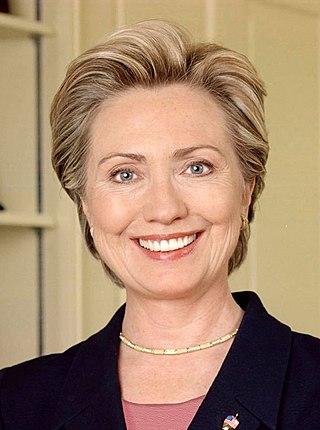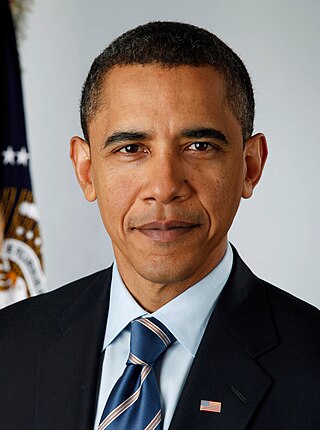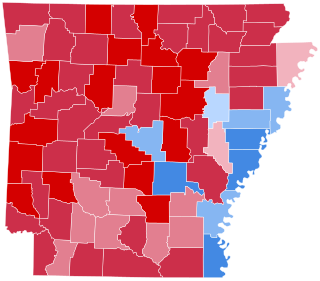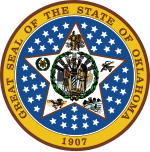
The 2008 Oklahoma Democratic presidential primary, part of the process of selecting that party's nominee for President of the United States, took place on February 5, one of the many nominating contests of 2008's "Super Tuesday". The primary election chose 38 pledged delegates to represent Oklahoma at the 2008 Democratic National Convention. The remainder of Oklahoma's 47 delegates consisted of unpledged superdelegates not bound by the results of the primary. The election was a closed primary, meaning that only registered Democrats could vote in this election. Hillary Clinton won the primary by a significant margin.

The 2008 Minnesota Democratic presidential caucuses took place on Super Tuesday, February 5, 2008 with 78 delegates at stake. The winner in each of Minnesota's eight congressional districts was awarded all of that district's delegates, totaling 47. Another 25 delegates were awarded to the statewide winner, Barack Obama. The 72 delegates represented Minnesota at the Democratic National Convention in Denver, Colorado. Sixteen other unpledged delegates, known as superdelegates, also attended the convention and cast their votes as well.

The 2008 Idaho Democratic presidential caucuses were held on Super Tuesday, February 5, 2008, with 18 national delegates at stake. For the first time, caucuses were held in all 44 counties, all of them open caucuses organized at the county level rather than the precinct level.

The 2008 Ohio Democratic presidential primary took place on March 4, 2008 and was open to anyone requesting a Democratic party ballot. In 2008, any registered Ohio voter could on election day request a primary ballot of either the Democratic or Republican party, by signing an affidavit stating that they supported the principles of the party whose ballot they are obtaining.

The 2008 Rhode Island Democratic presidential primary took place on March 4, 2008. It was an open primary. 21 delegates were awarded on a proportional basis. Rhode Island's delegation to the 2008 Democratic National Convention also included 11 superdelegates whose votes were not bound by the results of the primary election. Hillary Clinton won the primary.

The 2008 United States presidential election in Washington took place on November 4, 2008, and was part of the 2008 United States presidential election. Voters chose 11 representatives, or electors to the Electoral College, who voted for president and vice president.

From January 3 to June 5, 2012, voters of the Democratic Party chose its nominee for president in the 2012 United States presidential election. President Barack Obama won the Democratic Party nomination by securing more than the required 2,383 delegates on April 3, 2012, after a series of primary elections and caucuses. He was formally nominated by the 2012 Democratic National Convention on September 5, 2012, in Charlotte, North Carolina.

The 2008 United States presidential election in Delaware took place on November 4, 2008, and was part of the 2008 United States presidential election. Voters chose three representatives, or electors to the Electoral College, who voted for president and vice president.

The 2012 United States presidential election in Arkansas took place on November 6, 2012, as part of the 2012 General Election in which all 50 states plus the District of Columbia participated. Arkansas voters chose six electors to represent them in the Electoral College via a popular vote pitting incumbent Democratic President Barack Obama and his running mate, Vice President Joe Biden, against Republican challenger and former Massachusetts Governor Mitt Romney and his running mate, Congressman Paul Ryan.

The 2012 United States presidential election in Georgia took place on November 6, 2012, as part of the 2012 General Election in which all 50 states plus the District of Columbia participated. Georgia voters chose 16 electors to represent them in the Electoral College via a popular vote pitting incumbent Democratic President Barack Obama and his running mate, Vice President Joe Biden, against Republican challenger and former Massachusetts Governor Mitt Romney and his running mate, Congressman Paul Ryan.

The 2012 United States presidential election in Oklahoma took place on November 6, 2012, as part of the 2012 United States presidential election in which all 50 states plus the District of Columbia participated. Voters chose seven electors to represent them in the Electoral College via a popular vote pitting incumbent Democratic President Barack Obama and his running mate, Vice President Joe Biden, against Republican challenger and former Massachusetts Governor Mitt Romney and his running mate, Congressman Paul Ryan. For the third election in a row since 2004, no third parties were allowed on the ballot.

The 2012 United States presidential election in Tennessee took place on November 6, 2012, as part of the 2012 United States presidential election in which all 50 states plus the District of Columbia participated. Tennessee voters chose 11 electors to represent them in the Electoral College via a popular vote pitting incumbent Democratic President Barack Obama and his running mate, Vice President Joe Biden, against Republican challenger and former Massachusetts Governor Mitt Romney and his running mate, Congressman Paul Ryan.

The 2012 United States presidential election in Vermont took place on November 6, 2012, as part of the 2012 United States presidential election in which all 50 states plus the District of Columbia participated. Vermont voters chose three electors to represent them in the Electoral College via a popular vote pitting incumbent Democratic President Barack Obama and his running mate, Vice President Joe Biden, against Republican challenger and former Massachusetts Governor Mitt Romney and his running mate, Congressman Paul Ryan.

The 2012 United States presidential election in Kansas took place on November 6, 2012, as part of the 2012 United States presidential election in which all 50 states plus the District of Columbia participated. Kansas voters chose six electors to represent them in the Electoral College via a popular vote pitting incumbent Democratic President Barack Obama and his running mate, Vice President Joe Biden, against Republican challenger and former Massachusetts Governor Mitt Romney and his running mate, Congressman Paul Ryan. Romney and Ryan carried the state with 59.59 percent of the popular vote to Obama's and Biden's 38.00 percent, thus winning the state's six electoral votes.

The 2012 Arkansas Democratic presidential primary was held on May 22. Incumbent Barack Obama won the primary against Tennessee attorney and perennial candidate John Wolfe Jr, who unexpectedly captured nearly 42% of the vote. All 47 delegates were allocated to, and pledged to vote for Barack Obama at the 2012 Democratic National Convention. While John Wolfe Jr. qualified for 19 delegates to the convention by virtue of his performances in Arkansas, State party officials said Wolfe missed two paperwork filing deadlines related to the delegate process, therefore he was not eligible for any delegates. Wolfe commenced legal proceedings to have delegates in his name seated. Eight other unpledged delegates, known as superdelegates, also attended the convention and cast their votes as well.

The 2020 Oklahoma Democratic presidential primary took place on March 3, 2020, as one of 15 contests scheduled on Super Tuesday in the Democratic Party primaries for the 2020 presidential election, following the South Carolina primary the weekend before. The Oklahoma primary was a semi-closed primary, with the state awarding 43 delegates towards the 2020 Democratic National Convention, of which 37 were pledged delegates allocated on the basis of the results of the primary.

The 2020 Vermont Democratic presidential primary took place on March 3, 2020, as one of 15 contests scheduled on Super Tuesday in the Democratic Party primaries for the 2020 presidential election, following the South Carolina primary the weekend before. The Vermont primary was an open primary, with the state awarding 24 delegates towards the 2020 Democratic National Convention, of which 16 were pledged delegates allocated on the basis of the results of the primary.

The 2012 West Virginia Democratic presidential primary was held on May 8, 2012 as part of the 2012 Democratic presidential primaries.

The 2012 New Hampshire Democratic presidential primary took place on Tuesday, January 10, 2012, as the second major contest of the primary cycle following the Iowa caucuses the previous week. New Hampshire's 28 pledged delegates to the Democratic National Convention were allocated based on the results of the primary.

The 2012 Tennessee Democratic presidential primary took place on Tuesday, March 6, 2012, as part of Super Tuesday along with other primaries and caucuses. Tennessee's 82 pledged delegates to the Democratic National Convention were allocated based on the results of the primary.


















